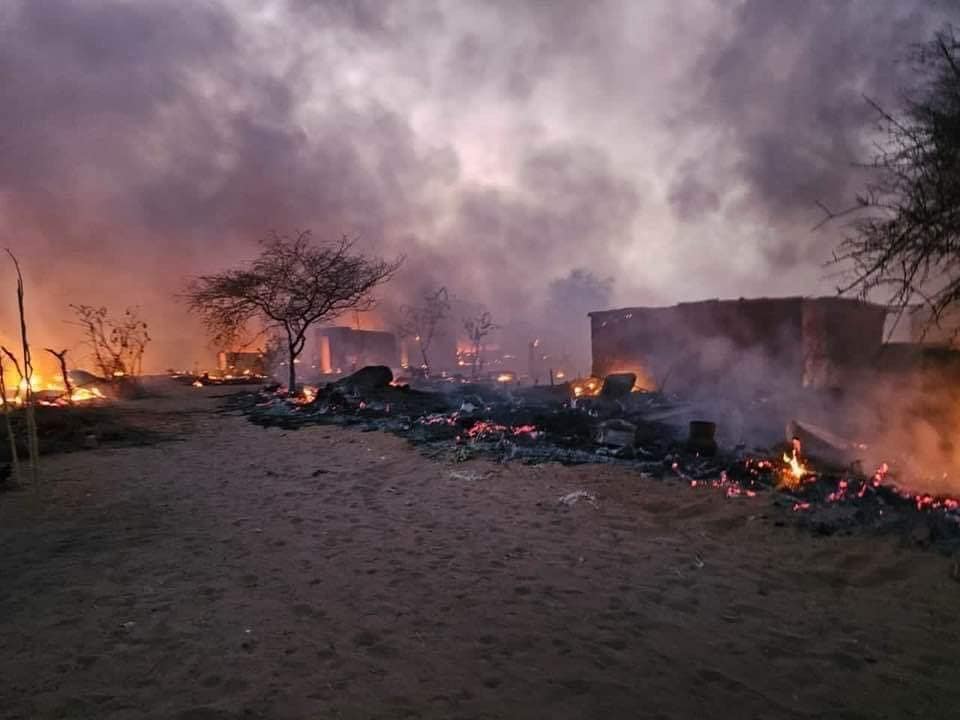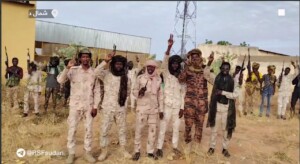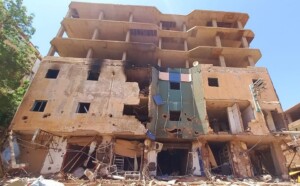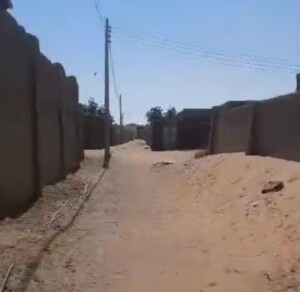Nine dead in RSF shelling of mosque in North Darfur capital

Aftermath of SAF-RSF fighting in El Fasher, North Darfur, taken on May 23, 2024 (File photo: El Fasher Resistance Committees via Facebook)
Nine people, among them eight children, were killed, and 11 others injured yesterday by missiles launched by the paramilitary Rapid Support Forces (RSF) on a neighbourhood in El Fasher, the capital of North Darfur.
Ibrahim El Ghali, who works at the Women and Maternity Hospital in El Fasher, told Radio Dabanga that the RSF heavily shelled the El Tijaniya neighbourhood in the northern part of El Fasher yesterday morning.
The El Tijaniya mosque, including its Koran school, and charity kitchen, were hit. Of the children and present in the mosque compound, nine, including an infant, were killed. The 11 wounded had to be taken to a hospital for treatment.
On Sunday morning, the RSF shelled the Sheinibat and Shagara neighbourhoods, killing and wounding a number of people. The injured were taken to a health centre in the Zamzam camp for the displaced, south of El Fasher.
More than 50 people died and at least 74 others were wounded by missiles in the past two weeks.
Besieged
Since February, El Fasher, in particular in the north and east, is besieged by the RSF. The people who did not flee the city are witnessing continuous shelling by the paramilitaries.
The International Crisis Group (ICG) reported on Monday that many thousands in the north Darfur capital are on the brink of famine. “Expanded hostilities in El Fasher would bring greater misery,” the group warned.
Their RSF attacks and battles with the Sudanese Armed Forces (SAF) and Darfur rebel combatants fighting alongside the army in El Fasher have left hundreds dead and wounded. Thousands of people fled to Tawila, El Salam. Others travelled to Nyala and Ed Daein, the capitals of South and East Darfur respectively, which are, next to El Geneina, West Darfur, and Zalingei, Central Darfur, under control of the RSF since the end of last year.
In mid-June, the UN Security Council adopted a British-drafted resolution, demanding the RSF to cease its blockade of El Fasher.
‘Bloodbath’
Many fear a “catastrophic bloodbath” following the RSF taking full control of the city, as this reportedly would also ignite strife between the Arab tribesmen supporting the RSF and the large Zaghawa tribe, from which most North Darfur rebel fighters hail.
In its May Situation Update, the Wisconsin-based Armed Conflict Location and Event Data Project (ACLED) warned that “ethnic-based attacks by the RSF and allied Arab militias are likely to escalate because of two reasons. First, the Zaghawa communities in North Darfur serve as strongholds for the [SLM] Minnawi faction.
“Second, on 24 April, the Zaghawa native administration [*] declared war against the RSF and offered a cut-off date for amnesty for fellow Zaghawa members of the RSF to withdraw. The RSF may abandon its retaliatory attacks aimed at the non-Arab communities, however, if the ongoing El Fasher battles stretch its capacity and force it to mobilize back toward the city to gain reinforcements,” the update stated.
Sudan Tribune reported in early June about clashes between RSF supporters and fighters of the SLM-MM inside Libya, resulting in deaths and injuries on both sides.
In case El Fasher falls, the RSF will control the entire Darfur region, except for the higher areas of the Jebel Marra massive, which are under control of the mainstream Sudan Liberation Movement, led by Abdelwahid Nur (SLM-AW).
* The Native Administration was instituted by British colonial authorities seeking a pragmatic system of governance that allowed for effective control with limited oversight by the state. The state-appointed tribal leaders were also responsible for executing policies, collecting taxes, and mobilising labour on behalf of the central government. According to the Darfur Bar Association (DBA), the Native Administration during the 30-year rule of dictator Omar Al Bashir did not represent the real community leaders.











 and then
and then